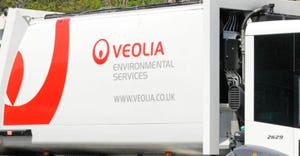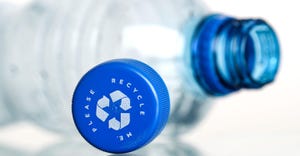Breaking Down Estre Ambiental’s Bet on Brazil’s Waste Management Industry
Waste360 recently spoke with Sérgio Pedreiro, Andreas Gruson and Marc Lasry about how the deal came together and how Estre is positioned to grow in the future.
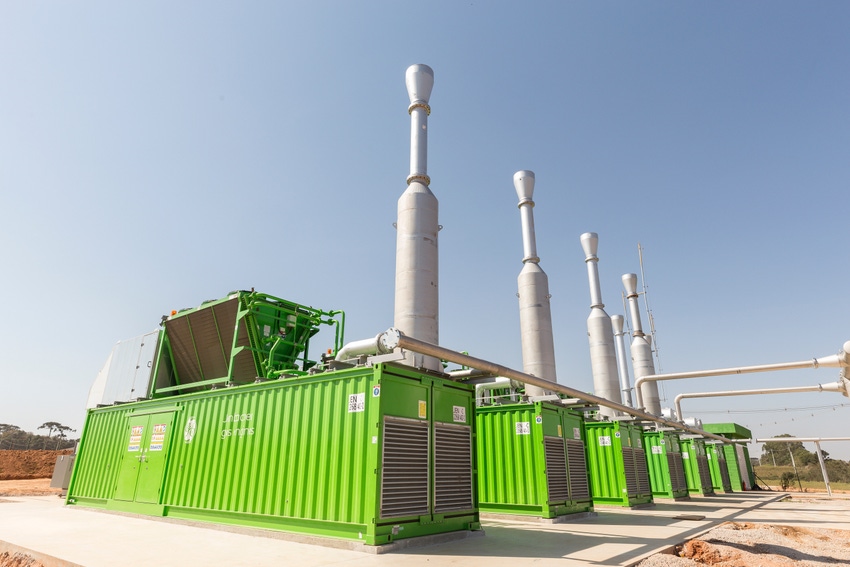
In August, Boulevard Acquisition Corp. II, an investment company sponsored by an affiliate of Avenue Capital Group, and Estre Ambiental S.A., the largest waste management company in both Brazil and Latin America, took a bold step. The entities struck a deal to enter into a definitive agreement to merge the two companies. The resulting firm, Estre Ambiental Inc., will do business in Brazil but be publicly traded in the U.S. on the NASDAQ exchange with an estimated enterprise value of $1.1 billion.
If all goes as planned, the deal will be completed by mid-December.
Estre currently provides a variety of waste and environmental service offerings, including collection services, landfill operations, biogas power and hazardous and medical waste treatment and disposal services, to more than 31 million people daily in seven Brazilian states. The company also has the largest portfolio of landfills in Brazil and is currently in the works of completing a number of tuck-in acquisitions to further grow its footprint.
Just last week, the firm announced it had entered into three independent memoranda of understanding to acquire three waste management companies in Brazil. All three transactions are expected to be completed in early 2018.
“Estre will continue to work hard to distinguish itself as one of the leading waste management enterprises in Latin America,” says Sérgio Pedreiro, CEO of Estre Ambiental S.A. “With Brazilian waste tonnage growing consistently at 4 percent per year over the last few years and a favorable regulatory framework, this transaction provides Estre the resources necessary to continue to capture growth and to invest in acquisition opportunities. We look forward to partnering with Boulevard to accelerate the execution of our growth strategy.”
Waste360 recently spoke with Sérgio Pedreiro, CEO of Estre Ambiental S.A.; Andreas Gruson, board member and director of Estre Ambiental S.A.; and Marc Lasry, chairman, CEO and co-founder of Avenue Capital Group and chairman of Boulevard Acquisition Corp. II, about how the deal came together and how Estre is positioned to grow in the future.
Waste360: Can you provide a brief overview of what this acquisition means for both Estre and Boulevard and the waste and recycling industry as a whole?
Sérgio Pedreiro: Estre is the largest waste management company in both Brazil and Latin America, and the company is one of the key players in the waste and recycling industry in Brazil.
Since launching in 1999, Estre has had ample growth. Historically, the company has entered the market through the development of landfills, which has helped the company capture market share. In more recent years, the company has integrated other services, such as collection services, recycling services, biogas power services and hazardous and medical waste treatment and disposal services.
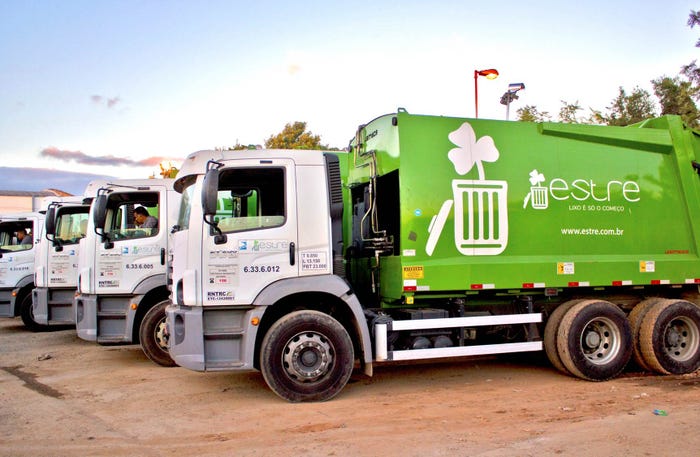
That being said, this transaction with Boulevard will allow Estre to accelerate its growth and investment. In addition, it will allow the company to continue its strategy of deploying new landfills in areas of Brazil that aren’t currently being served by the company’s infrastructure.
Just last week, Estre signed three independent agreements to acquire three local companies that will help increase the density of the areas that the company already serves. The transaction will allow us to continue and accelerate the pursuit of these kinds of opportunities. Between the development of new landfills and tuck-in acquisitions, Estre will be able to enter new markets and quickly increase its rate of growth.
Marc Lasry: For us, Estre represents an opportunity to own the leading player in a fragmented industry, which is positioned to benefit from Brazil’s improving macroeconomic outlook and a positive regulatory shift toward more responsible waste disposal. Aside from the high, single-digit organic growth the company is already capturing, it also has the managerial and strategic capacity to deploy capital wisely, including through accretive acquisitions.
Waste360: Under the terms of the transaction, a new holding company will be formed. Tell us a little bit about that.
Sérgio Pedreiro: The only big change is that the company will be listed on NASDAQ, so the shareholders won’t really see any changes. The shares for the new holding company Estre Ambiental, Inc. (ESI) are already available, and once the acquisition is complete, the ticker symbol will change from BLVD to ESTR. We anticipate the merger to be complete by mid-December.
Waste360: Tell us about the future board of ESTR and what those experienced members and leaders will bring to the company.
Sérgio Pedreiro: The board is both professional and independent. It features members like Richard Burke, CEO of Advanced Disposal; Klaus Pohle, former president of the Accounting Standards Committee of Germany; Robert Boucher Jr., CEO and president of Wheelabrator Technologies; and John J. Morris Jr., senior vice president of Waste Management, who are leaders with the highest levels of industry knowledge and compliance expertise.
Estre is very pleased that these highly experienced individuals have joined the board because they will bring great knowledge from both a U.S. and international perspective. This is especially important for the company because what’s happening in Brazil right now is very similar to what the U.S. went through with the passage of regulations and elimination of illegal dumping years ago.
Waste360: How does waste management in Brazil compare/differ from waste management in the U.S.?
Andreas Gruson: The structure of the waste industry in Brazil is very similar to the structure of the waste industry in the U.S. When you look at the value chain within the waste industry in Brazil and the different processes and procedures, the Brazilian market is exactly the same as the U.S. market. However, the Brazilian model is very dissimilar from the European model.
Brazil is very landfill centric, much like the U.S., and Estre enters new markets through the development of landfills. From there, collection models are built around the functionality and location of those landfills.
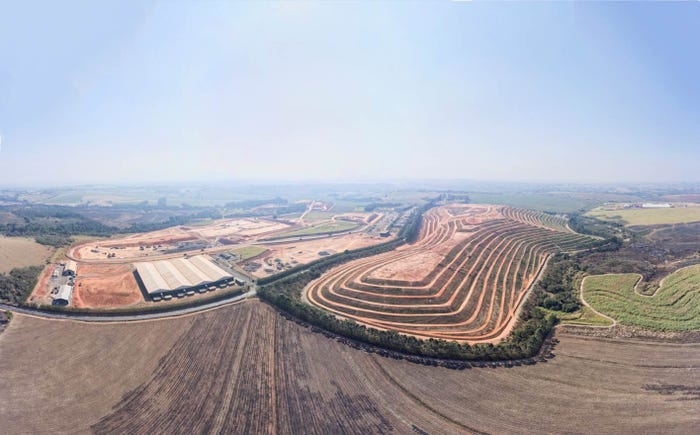
Waste360: Currently, 47 percent of municipal solid waste (MSW) is not properly disposed of in Brazil. Can you share how Estre plans to tackle that issue?
Sérgio Pedreiro: Estre has been able to grow very quickly by providing the infrastructure needed to combat this issue. The company has the largest portfolio of landfills, and that’s the most-needed infrastructure in terms of the waste industry in Brazil.
Estre has 13 landfills and five new greenfield landfills that are in different stages of development. Similar to the U.S., we purchase the land for the landfills and then go through the permitting process, which takes about five years in Brazil.
In addition, we will continue offering environmental education through the Institute of Estre, which has a goal to provide environmental education primarily to children. Each year, we invest more than $1 million in the institute so that more than 5,000 children can receive training and education about the environment. This is very important because we need children to understand the difference between a proper landfill and what happens when waste is dumped illegally in an open area.
For the month of October, we actually travel around to different locations where we are not currently present to educate others about our landfill models and sites.
Andreas Gruson: When Subtitle D first went into effect in the U.S., many municipalities had landfills, but about a quarter of the landfills no longer complied with the regulations and were considered illegal. It took the U.S. about 10 to 15 years to get to a point where its modern sanitary landfills were 100 percent compliant with Subtitle D.
Brazil is going through a similar experience right now. The regulations were passed in 2010, and it may take us a few years to get to full compliance. While we are unsure about the timeframe, Estre has the best management team and experience when it comes to siting, permitting, developing and operating landfills, so I expect that the company will be on the forefront of that opportunity.
Waste360: Estre has four main areas for growth: Brazil’s waste management industry, Latin America’s waste platform, a strong leadership team and sponsorship and attractive valuation. Can you shed some light on those four key areas?
Sérgio Pedreiro: The waste industry in Brazil has been growing about two times as fast as the waste industry in the U.S. This is a result of the economy growing because there’s more income per capita, more money spent and more waste generated. If you look at the per capita level in Brazil compared to the U.S., it’s about one-third in terms of waste per capita generated. We expect that number to increase over time, generating faster growth.
At the same time, there is a significant part of the market that’s underserved, and that’s additional blue sky that we have to grow the business. Again, what’s happening in Brazil is similar to what’s happening in the U.S., but we have the opportunity to deploy infrastructure into markets that aren’t currently being served.
Estre is really the best company in terms of its position to capture that growth because of its strategic location of landfills and assets. The seven states where we operate in Brazil currently account for half of the population of the country. Because of this, we are very well positioned to densify our operations through acquisitions and organic growth.
Estre, compared to the other waste management companies in Brazil, is professionally run. The company was founded by one individual back in 1999, and it has never been family owned or operated. We have a culture that’s obsessed with professional excellence. If you look at our growth in terms of top line and margins, you will see what we’re ahead of our competitors in Brazil in terms of both the culture and the performance of the company.
Marc Lasry: We decided to partner with Estre because all the fundamentals are there. This is a strong operating company in a stable and growing industry, with clear organic and inorganic growth opportunities, run by a strong leader with a world-class management team. Beyond this, what really made the deal work was the attractive valuation. We don’t believe it makes sense that a Brazilian waste management company growing twice as fast as its U.S. counterparts is trading at a 7.7x EBITDA multiple versus U.S. firms trading around 10.5x. That 25 percent valuation discount and Estre’s double-digit EBITDA growth give us room to substantially increase equity value in the next few years.
Waste360: Can you talk a little bit about Estre’s growth algorithm?
Sérgio Pedreiro: It’s actually very simple. Our organic growth makes up about 7 to 8 percent of our growth and tuck-in acquisitions make up about another 7 to 8 percent of our growth, resulting in a sustainable growth rate in the mid-teens.
If you look at our most recent financial results, the company has been around about a 7 percent compound for the last few years. Moving forward, we expect the same or better level of organic growth because the economy is turning up in Brazil right now. In 2015-16, Brazil went through its worst economic crisis in 100 years; the economy came down about 7 percent in just two years. That was a huge hit to the economy, but nevertheless, we were able to continue to build the business at about 7 percent during that crisis.
Now, in 2017, we see the economy returning to growth, and we expect it to grow about 2 percent in 2018. Moving forward from here, we continue to forecast organic growth in the range of 7 percent and potential tuck-in acquisitions also in the range of 7 percent.
Waste360: Estre has pre-identified 10 potential acquisition targets, shortlisted five and just secured three. Tell us what those potential acquisitions could mean for the future of the company.
Sérgio Pedreiro: Last week, we announced that we have signed three separate, independent agreements with the three local waste management companies with whom we were in discussions with. These three acquisitions will add an incremental $9.5 million to our 2018 EBITDA, bringing us a new landfill and about 230 collection vehicles.
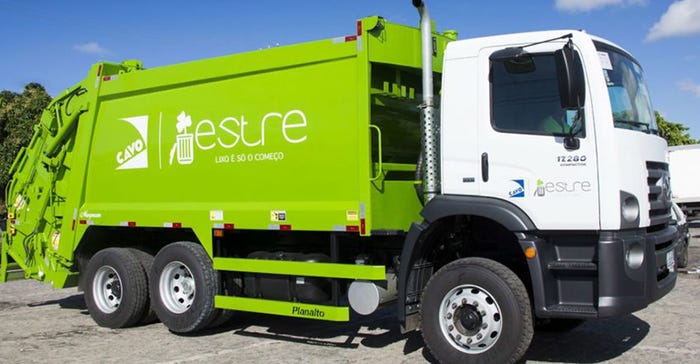
These acquisitions are all small, family-owned companies that are facing succession issues. They will bring additional growth to the areas where we are already present, expanding our coverage in three key geographies and across 100 new clients. Ultimately, we are buying collection companies to aggregate trucks, routes and contracts to our existing operations in various areas.
With that being said, we are creating a very powerful infrastructure that we can leverage as we bring additional contracts, trucks and routes into the system. These acquisitions present growth opportunities as well as value creation opportunities. Typically, we buy at a multiple of 3x EBITDA at the low end and 5x EBITDA at the high end. We plan on following that same approach in the future.
Waste360: Tell us a little bit about Estre’s service offerings and operations, which include collection services, landfill operations, biogas power and hazardous and medical waste treatment and disposal.
Sérgio Pedreiro: Collection services represent about two-thirds of our revenues and landfill operations represent about 30 percent of our revenues; our EBITDA is roughly split between the two. Those are really the two core components of our operations, but the biogas power and hazardous and medical waste treatment and disposal services are very attractive and will continue to grow going forward.
One of our biggest growth opportunities is with our biogas power generation services. Right now, the activity is generating about 14 megawatts, and we have the potential to increase that activity to more than 80 megawatts. Two of our landfills currently provide this service, and we want to expand it to our entire portfolio of 13 landfills in the future.
About the Author(s)
You May Also Like



